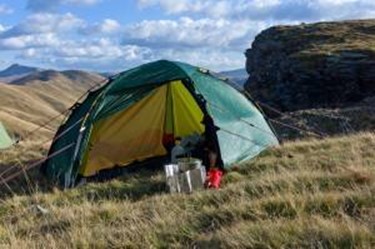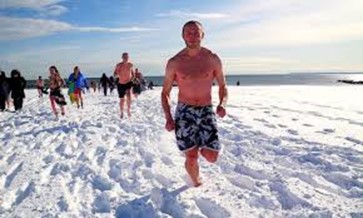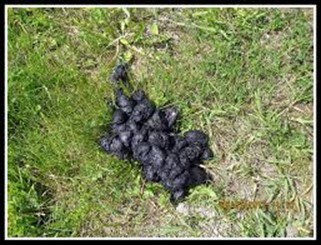Here’s another great article from our friends Dr. Bones and Nurse Amy.

CAMPING SAFETY
The school year is ending, and families are planning the summer’s camping trip. Camping trips are a great way to create bonds and memories that will last a lifetime. A poorly planned camp out, however, can become memorable in a very bad way, especially if someone gets injured. A few preparations and an assessment of everyone’s limitations will help you enjoy a terrific outing with the people you care about.
KNOW YOUR LIMITS
If you haven’t been camping much, don’t start by attempting to hike the entire Appalachian Trail. Start by taking day trips to National Parks or a local lake. Set up your tent and campfire. See how it goes when you don’t have to stay in the woods overnight. If the result is a big thumbs-up, start planning your overnight outings.
Whatever type of camping you do, always assess the capabilities and general health of the people in your party. Children and elderly family members will determine the limits of your activities. The more ambitious you are, the more likely the kids and oldsters won’t be able to handle it. Injuries are the end result of overdoing it.
PLANNING
An important first step to a safe camping trip is knowledge about the weather and terrain you’ll be encountering. Talk with park rangers, consult guidebooks, and check out online sources. Some specific issues you’ll want to know about:
- Temperature Ranges
- Rain or Snowfall
- Trails and Campsite Facilities
- Plant, Insect or Animal Issues
- Availability of Clean Water
- How to Get Help in an Emergency
COMMON MEDICAL RISKS

Probably not appropriately dressed for the climate…
A very common error campers make is not bringing the right clothing and equipment for the weather and terrain. If you haven’t planned for the environment you’ll be camping in, you have made it your enemy.
Although Spring and Fall have the most uncertainty with regards to temperatures and weather, you could encounter storms in any season. Conditions in high elevations lead to wind chill factors that could cause hypothermia. If the temperature is 40 degrees, but the wind chill factor is 20 degrees, you lose heat from your body as if it were 20 degrees out. Be aware that temperatures at night may be surprisingly cold. Even summer rain can lead to a loss in body temperature if you’re drenched.
In cold weather, you’ll want your family clothed in layers. Use clothing made of tightly woven, water-repellent material for protection against the wind. Wool holds body heat better than cotton does. Some synthetic materials work well, also, such as Gore-Tex.
If you’re at the seashore or lakefront in summer, your main problem will be heat exhaustion and burns. Have your family members wear sunscreen, as well as hats and light cotton fabrics. Plan your strenuous activities for mornings, when it’s cooler. In any type of weather, keep everyone well-hydrated. Dehydration will cause more rapid deterioration in physical condition in any type of stressful circumstance.
The most important item of clothing is, perhaps, your shoes. If you’ve got the wrong shoes for the outing, you will most likely regret it. If you’re in the woods, high tops that you can fit your pant legs into are most appropriate to provide
protection against snakebite. If you go with a lighter shoe in hot weather, Vibram soles are your best bet.
Special Tips: Choosing the right clothing isn’t just for weather protection. If you have the kids wear bright colors, you’ll have an easier time keeping track of their whereabouts. Long sleeves and pants offer added protection against insect bites that can transmit disease, such as Lyme disease.
YOUR CAMPSITE
Real estate agents’ motto is “location, location, location” and it’s true for camping safety too. Scout prospective campsites by looking for broken glass and other garbage that can pose a hazard.
Look for evidence of animals/insects nearby, such as large droppings or wasp nests/bee hives. If there are berry bushes nearby, you can bet it’s on the menu for bears. Berries that birds and animals can eat are often unsafe for humans to eat. Advise the children to stay away from any animals, even the cute little fuzzy ones.

Bear Droppings! Camp somewhere else…
Learn to recognize poison ivy, oak, and sumac. Show your kid pictures of the plants so that they can look out for and avoid them. The old adage is “leaves of three, let it be”. Fels-Naptha soap is especially effective in removing toxic resin if you suspect exposure. The resin can stick to clothes, so use it for washing.
Build your fire in established firepits and away from dry brush. In drought conditions, consider using a portable stove instead. Children are especially fascinated by fires, so watch them closely or you’ll be dealing with burn injuries. Food (especially cooked food) should be hung in trees in such a way that animals can’t access it. Animals are drawn to food odors, so use resealable plastic containers.
If you camp near a water source, realize that even the clearest mountain stream may harbor Giardia, a parasite that causes diarrheal disease and dehydration. Water sterilization is basic to any outdoor outing. There are iodine tablets that serve this purpose, and portable filters like the “Lifestraw™” which are light and effective. Boiling the water first is a good policy in any situation, although time-consuming.
GETTING LOST
Few people can look back to their childhood and not remember a time when they lost their bearings. Your kids should always be aware of landmarks near the camp or on trails. A great skill to teach the youngsters is how to use a compass; make sure they have one on them at all times as well as a loud whistle that they can blow if you get separated. Three consecutive blasts is the universal signal for “help!”. If lost, kids should stay put in a secure spot. Of course, if you have cell phone service, consider that option as well.
INSECT BITES
Even if you’ve clothed the kids in protective clothing, they can still wind up with insect bites. Carry a supply of antihistamines, sting relief pads, and calamine lotion to deal with allergic reactions. Asking your doctor for a prescription “Epi-Pen” is a good idea if anyone has ever had a severe reaction to toxins from insect bites or poison ivy. They’re easy to use and effective, and few doctors would refuse to write a script for it.
Citronella-based products are helpful to repel insects; put it on clothing instead of skin (absorbs easily) whenever possible. Repellents containing DEET also can be used, but not on children less than 2 years old. Don’t forget to inspect daily for ticks or the bulls-eye pattern rash they often cause; as mentioned earlier in the article, they can transmit Lyme Disease. If you remove the tick in the first 24 hours, you will rarely contract the disease.
YOUR CAMPING FIRST AID KIT
Besides the usual equipment, insect repellants, and a way to sterilize water, you will want to carry a medical kit to deal with common problems. This should contain:
- Antiseptics to clean wounds (iodine pads are good)
- Bandages of different types and sizes: butterfly, roller, pads, moleskin, elastic (Ace wraps)
- Cold packs to reduce swelling
- Splints (splints and larger conforming ones)
- Burn gel and non-stick dressings like Telfa pad
- Nitrile gloves (some people are allergic to latex)
- Bandannas or triangular bandages with safety pins to serve as slings
- A bandage scissors
- tweezers (to remove splinters and ticks)
- topical antibiotic cream
- Medications: Oral antihistamines (such as Bendadryl)
Pain meds (Acetaminophen, Ibuprofen, Aspirin, also good for fever)
1% hydrocortisone cream to decrease inflammation
BZK (Benzalkonium Chloride) wipes for animal bites
Your personal kit may require some additional items to handle special problems with members of the family that have chronic medical issues. Take the above-listed items and add more to customize the kit for your specific needs.
In an emergency, the most important thing to do is to simply stay calm. You’re armed with the materials you packed in your first aid kit; use them! Don’t fail to take a first aid course, so you’ll have the knowledge needed to be a medical asset. If you do this, you’ll have the best chance to have a safe and (happily) memorable camping trip with your family.
Joe Alton, M.D., aka Dr. Bones
Start now to make sure you are staying prepared.
Via: doomandbloom




 Follow
Follow